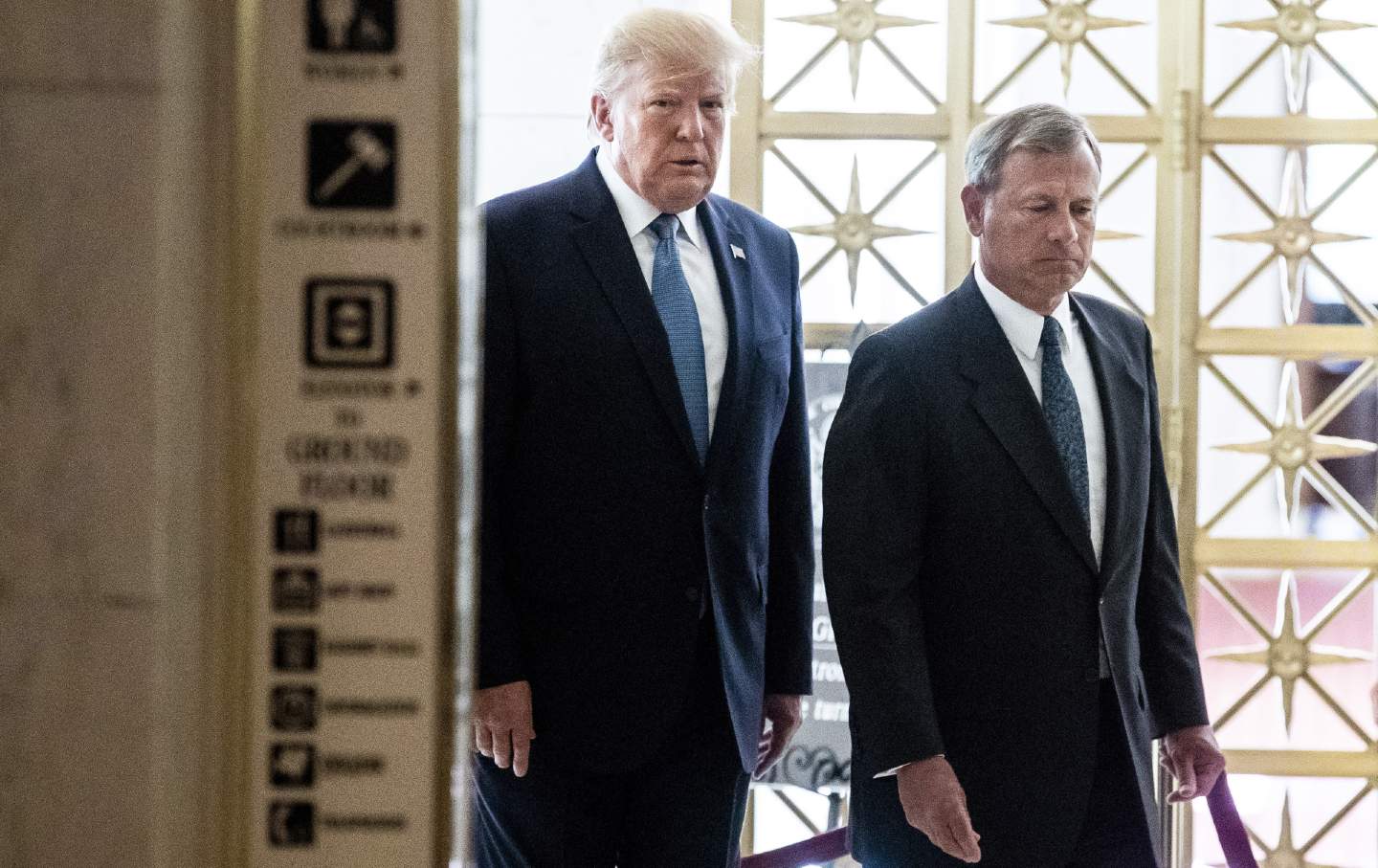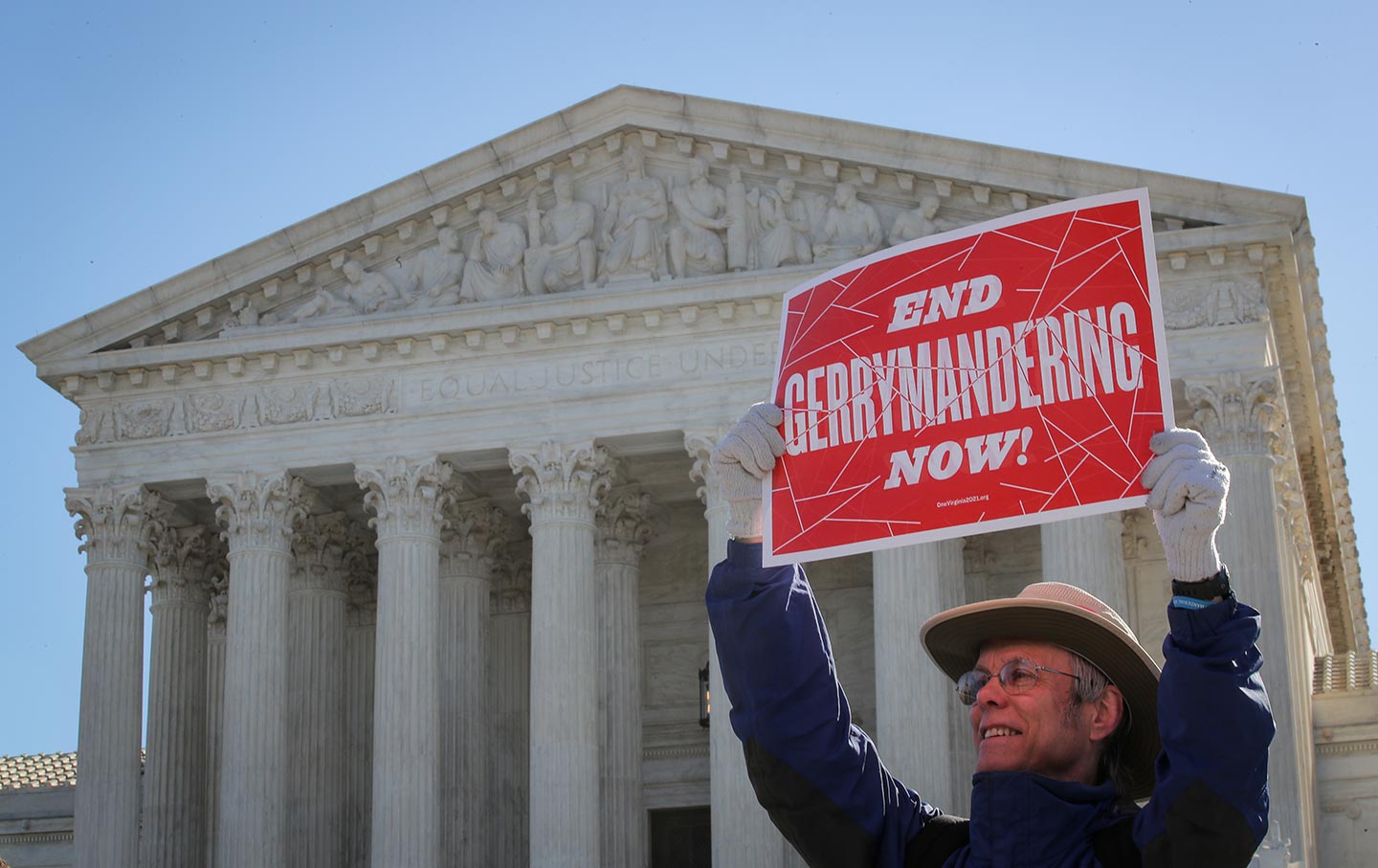How John Roberts Went Full MAGA
A revealing article in The New York Times details how the chief justice put his thumb on the scale for Trump to keep him on the ballot and out of jail.

Former president Donald Trump and Chief Justice John Roberts.
(Michael Reynolds / Pool via Bloomberg
It would appear that the chief justice of the Supreme Court of the United States, John Roberts, has been fully captured by the cult of Donald Trump. An article by Jodi Kantor and Adam Liptak in Sunday’s New York Times details how Roberts has been spending his time putting his heavy thumb on the scales to help Trump accomplish his legal and political goals. What it reveals is that Roberts wanted to make sure Trump could run in this election, wanted to make sure Trump escaped accountability for his many crimes, and wanted to grant Trump unprecedented immunity to commit additional crimes should he be returned to office.
Roberts accomplished this through three key cases, all of which the court heard in the last term, and all of which Kantor and Liptak break down with careful detail. Their reporting shows how Roberts abandoned a moderate, consensus-building approach in his decision to ignore valid 14th Amendment objections to Trump’s eligibility to run for office and instead opted for a more controversial and conservative ruling that sparked a fractured concurrence from the women on the Supreme Court. They explain how Roberts removed Samuel Alito (then mired in flag-related controversies) from the case that gave the January 6 rioters a way to get out of jail so he could write his own opinion giving aid and comfort to the terrorists (while also dodging questions about the court’s partisan rulings). And, most important, they reveal how Roberts decided to grant Trump unprecedented immunity before the case was even argued in front of his court.
In all these cases, the article shows that Roberts had a chance to build consensus decisions by striking a moderate tone with the liberal justices, but instead opted for hard-line MAGA positions that gave Trump everything he wanted. Hopefully, this puts a long-overdue end to the false media narrative that Roberts is a moderate institutionalist.
While the internal workings of the usually opaque Supreme Court can be fascinating from an inside-baseball perspective, nothing in the report is surprising to me. Roberts has always been a person who tries to push the law as far to the right as Samuel Alito, without Alito’s bad press and caustic demeanor. The idea of Roberts as a moderating influence has always been false. He just wants the court to promote the partisan Republican agenda without seeming partisan. That doesn’t make him an institutionalist; it just makes him a better liar than the rest of his conservative friends.
What’s significant, to me, about this article is that it shows how Roberts has abandoned his thin veneer of nonpartisanship when it comes to Trump. The idea of Roberts as some kind of “NeverTrump” Republican has been fully exposed as false, and we can expect Roberts to do what he can to further aid Trump as this election season draws to a close.
I have a couple of theories for what happened to Roberts, and how he became like this. The first will be familiar to any person who has watched painfully as they’ve lost their father or grandfather to the white-wing MAGA cult: Fox News is poison to the brains of old men. If you watch enough of it, you will slowly come to believe in a world that does not exist.
I cannot say for sure where Roberts gets his news, but one line from the Times piece jumped off the page in support of my theory. Kantor and Liptak wrote: “In his writings on the immunity case, the chief justice seemed confident that his arguments would soar above politics, persuade the public, and stand the test of time.”
That view is deranged, but it’s deranged in a way that I’ve seen before from Fox watchers. They become convinced that their view is “nonpartisan” and that everybody else is paid to oppose them by George Soros. They lose touch with how they sound to anybody outside their echo chamber of rabid conservatives. You cannot write, as Roberts did, that presidents are “absolutely immune for official acts” in order to help Trump get away with his crimes, and then think that such a statement will “soar above politics” or even be persuasive to anybody other than your fellow cultists. Watching Fox all day is one way to fool yourself into thinking that giving Trump the legal powers of a king is mainstream.
My other theory of the case is that Justices Clarence Thomas and Samuel Alito have simply won a long-standing argument they’ve been having with Roberts for years. If you believe, as I do, that Thomas, Alito, and Roberts all want the same terrible things to happen to women, people of color, and any laws, rules, or regulations that might preserve our environment, support labor, or rein in corporate greed, then you’ll see that the central debate they’ve been having for almost 20 years is about speed.
Thomas and Alito, in their opinions and concurrences, have been arguing for the conservative court to go as extreme as possible as fast as possible. Roberts has been arguing for a slower, incremental approach to unmaking the 20th century and resetting the law to circa 1861. Thomas and Alito have essentially been adopting Fyre Festival logic (“let’s just do it and be legends”) while Roberts has been operating like a J.R.R. Tolkien Ent (“don’t be hasty”). Roberts wants all the bad things those other guys want, but what others have seen as institutionalism I’ve always seen as genuine fear that the political branches will clap back and clip his wings if the court gets too far ahead of itself.
Now, Thomas and Alito have won that argument, because after the Dobbs decision, in which the Supreme Court ripped away abortion rights in the quickest and most extreme way possible, the political branches did… nothing. The Supreme Court, which subverted the will of the people and took away reproductive rights, has faced no consequences in the years since they did it. Only now are leaders in the Democratic Party even talking about reform, and most of those reforms, as currently proposed, will be subject to Supreme Court approval.
Roberts has likely realized that he can do what he’s always wanted to do without fear of his court being held accountable. In addition to taking away a constitutional right for the first time in American history, the Roberts court has also ended affirmative action, enabled unregulated access to guns, and begun the process of dismantling the administrative state. There is nothing Roberts wants to do that he cannot do right now.
And he can keep doing it—as long as Trump wins the upcoming election. I would argue that this is critical to understanding why Roberts is in the tank for Trump. Roberts doesn’t give a damn about democracy—he is the leader of the least democratic institution in the entire country. He doesn’t fear Trump like Republican institutionalists do, because he knows that Trump won’t do anything to the Supreme Court as long as the court dutifully rules in favor of Trump’s policies, which also happen to be policies that the conservative supermajority generally agrees with.
The top takeaway for Vice President Kamala Harris and her campaign apparatus should be this: Harris has to win the election in an Electoral College landslide, or else Roberts and his Supreme Court will hand the election to Trump. Kantor and Liptak’s reporting couldn’t have been more clear that Roberts favors Trump’s ridiculous legal arguments, even when those arguments fly in the face of facts, common sense, judicial precedent, and the Constitution.
If, after the election, the Supreme Court has to flip a bunch of states that voted for Harris into Trump’s column, then I don’t think even Roberts can get that done. Institutionalist or no, there is the point where you risk open revolution if you hand an election to Trump that he loses by 100 electoral votes. But if Roberts has to flip only one state into Trump’s column—if all he has to do is flip, say, Pennsylvania’s electoral votes from Harris to Trump, and if he can accomplish that by suddenly ruling that nobody’s votes in Philadelphia should count—well, I expect Roberts will do just that.
Roberts and the conservative supermajority on the Supreme Court want Trump to win. All election prognostications and planning must take that into account.
Popular
“swipe left below to view more authors”Swipe →Disobey authoritarians, support The Nation
Over the past year you’ve read Nation writers like Elie Mystal, Kaveh Akbar, John Nichols, Joan Walsh, Bryce Covert, Dave Zirin, Jeet Heer, Michael T. Klare, Katha Pollitt, Amy Littlefield, Gregg Gonsalves, and Sasha Abramsky take on the Trump family’s corruption, set the record straight about Robert F. Kennedy Jr.’s catastrophic Make America Healthy Again movement, survey the fallout and human cost of the DOGE wrecking ball, anticipate the Supreme Court’s dangerous antidemocratic rulings, and amplify successful tactics of resistance on the streets and in Congress.
We publish these stories because when members of our communities are being abducted, household debt is climbing, and AI data centers are causing water and electricity shortages, we have a duty as journalists to do all we can to inform the public.
In 2026, our aim is to do more than ever before—but we need your support to make that happen.
Through December 31, a generous donor will match all donations up to $75,000. That means that your contribution will be doubled, dollar for dollar. If we hit the full match, we’ll be starting 2026 with $150,000 to invest in the stories that impact real people’s lives—the kinds of stories that billionaire-owned, corporate-backed outlets aren’t covering.
With your support, our team will publish major stories that the president and his allies won’t want you to read. We’ll cover the emerging military-tech industrial complex and matters of war, peace, and surveillance, as well as the affordability crisis, hunger, housing, healthcare, the environment, attacks on reproductive rights, and much more. At the same time, we’ll imagine alternatives to Trumpian rule and uplift efforts to create a better world, here and now.
While your gift has twice the impact, I’m asking you to support The Nation with a donation today. You’ll empower the journalists, editors, and fact-checkers best equipped to hold this authoritarian administration to account.
I hope you won’t miss this moment—donate to The Nation today.
Onward,
Katrina vanden Heuvel
Editor and publisher, The Nation
More from The Nation

How Rob Reiner Tipped the Balance Against Donald Trump How Rob Reiner Tipped the Balance Against Donald Trump
Trump’s crude disdain for the slain filmmaker was undoubtedly rooted in the fact that Reiner so ably used his talents to help dethrone him in 2020.

The Economy Is Flatlining—and So Is Trump The Economy Is Flatlining—and So Is Trump
The president’s usual tricks are no match for a weakening jobs market and persistent inflation.

Trump’s Vile Rob Reiner Comments Show How Much He Has Debased His Office Trump’s Vile Rob Reiner Comments Show How Much He Has Debased His Office
Every day, Trump is saying and doing things that would get most elementary school children suspended.

How the Groypers Hope to Remake Trump's GOP How the Groypers Hope to Remake Trump's GOP
The perilous politics behind the elevation of Nick Fuentes.




